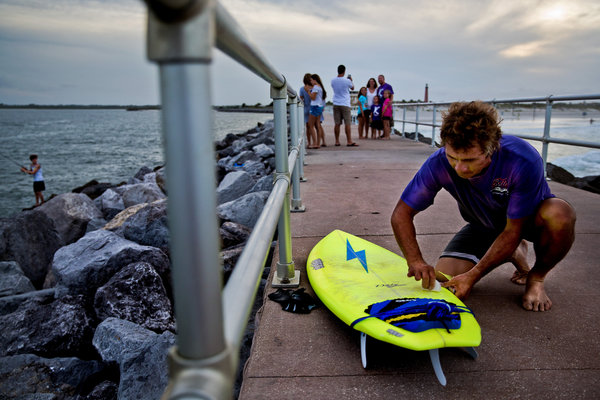Flash Dance: Adventures in Lightning Photography
MIA MI — I’ve grown accustomed to thunderstorms. After living and working in Florida for nearly six years, I know to carry a pair of tall rubber boots, a rain jacket, towels and covers for my cameras at all times.
Though lightning is one of the most powerful and unpredictable forces of nature, I didn’t used to fear it much, because it can be so constant here. My thinking has changed since working on a recent story by Lizette Alvarez about four survivors of lightning strikes in Florida, where more people die from them than in any other state.
When Mor rig an McCarthy, a photo editor on the National desk, reached out to me about photographing James Church in Ponce Inlet, F la., I was immediately interested. (I had heard some bizarre lightning strike stories, and the idea of surviving a strike fascinated me.)
I was also tasked with shooting a scene setter for the article. Mor rig an and I discussed the idea of capturing multiple bursts of lightning, to illustrate the frequency of strikes in Florida. In the days after, I watched weather radar and read articles about photographing lightnin.jpg) g. I’d done it before, but I wasn’t a seasoned storm photographer. Most of the extreme weather stories I had worked on had to do with the aftermath of storms, not the here and now.
g. I’d done it before, but I wasn’t a seasoned storm photographer. Most of the extreme weather stories I had worked on had to do with the aftermath of storms, not the here and now.
James Church waxed his surfboard where he was struck by lightning, at Lighthouse Point Park in Ponce Inlet, F la., on July 13. After his incident, a friend put a blue lightning bolt on his board.
Scott McIntyre for The New York Times
In South Florida, storms can come and go quickly, so I picked a spot near my apartment in Miami Beach that had an open view of downtown Miami and Biscayne Bay. I figured any time spent in the car was time I could be missing potential lightning. It wasn’t until around 5 p.m. the day before I had to drive to Ponce Inlet that I saw what looked like storm clouds starting to form.
I placed my camera on a tripod at the water’s edge and waited. And waited. I began to think I might have been mistaken about the clouds. I saw lightning, but only one or two bursts every 20 minutes or so. I considered bailing, but thought to myself: If you leave now, you know there will be lightning happening as soon as you walk in the door.
As a photographer, waiting for the right moment often takes up more time than actually making the picture. Sometimes patience pays off, and sometimes it doesn’t. But I’d rather have peace of mind, knowing that I tried, than regret not waiting long enough.
In this case, the waiting finally paid off. As the sun was setting in the west, throwing a splash of orange against the dark storm clouds, the flashes of lightning began. I decided to shoot a series of long exposures, hoping to catch bright bursts. The lightning was happening behind the clouds, so I didn’t see any bolts, but it lit up the sky for long enough to make a storytelling photo, and to allow me to capture its frequency.
The next day, I hit the road to meet James Church, who had been struck by lightning while he was fishing alone one early morning along the jetty at Lighthouse Point Park. He took me to the exact spot where he was struck and brought the same fishing pole he was using that day. He showed me how he was lying on the ground when he woke up and how he had to swing his body around to get to his tackle box. The fact that he remembered as many details as he did surprised me. Despite losing two fingers and half of his small and large intestines (which had been burned and damaged), he still goes fishing when he can and also loves to surf. After we finished our photos for the night, he decided to get some surfing in before the park closed. A large blue lightning bolt sticker he got from a friend now decorates a large part of his board, serving as a reminder as well as a conversation starter.
I couldn’t help but wonder how I myself might react to an out-of-the-blue event that could hinder the use of my hands or another part of my body. Would I let it change my outlook? Would I quit photography? James had a few good excuses to take it easy for a while, but he didn’t. In a similar situation, I’d like to think I wouldn’t either.
great job